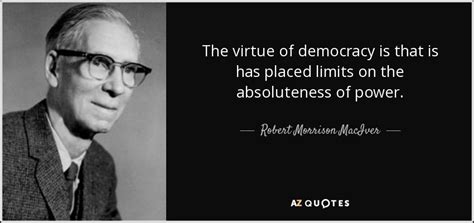A Quote by Robert Morrison MacIver
We are apt to think we know what time is because we can measure it, but no sooner do we reflect upon it than that illusion goes. So it appears that the range of the measureable is not the range of the knowable. There are things we can measure, like time, but yet our minds do not grasp their meaning. There are things we cannot measure, like happiness or pain, and yet their meaning is perfectly clear to us.
Related Quotes
The saying of Protagoras is like the views we have mentioned; he said that man is the measure of all things, meaning simply that that which seems to each man assuredly is. If this is so, it follows that the same thing both is and is not, and is bad and good, and that the contents of all other opposite statements are true, because often a particular thing appears beautiful to some and ugly to others, and that which appears to each man is the measure
Racism itself is difficult to measure. We can measure hate crimes - which are absolutely an indicator. We can measure reports of discrimination. We can measure the number of times hateful words are being used across the Internet. Those things all help us measure racism, but it can sometimes be nebulous.
What do we measure when we measure time? The gloomy answer from Hawking, one of our most implacably cheerful scientists, is that we measure entropy. We measure changes and those changes are all for the worse. We measure increasing disorder. Life is hard, says science, and constancy is the greatest of miracles.
Successful businesses measure and count things. I think that's a safe assumption on top of which we can drop the following hypothesis: unsuccessful business either measure nothing, the wrong things, too many things, or finally, they measure the right things but they don't communicate the measurements efficiently.
The thing you can't measure is someone's heart, someone's desire. You can measure a 40, his vertical, his bench press, and that might let you know things like, yeah, he can jump high. But desire, his dedication, his determination, that's something you can't measure. That's something you can't measure about Rod Smith.
I was probably 14 or 15 when I was first on stage at school doing 'Measure for Measure.' I immediately felt it was a great way of expressing oneself at a moment when I didn't think I could express myself, really. I suddenly had access to this range of emotions and thoughts and feelings that were there in me. I was surprised by that.
The measure of a life is a measure of love and respect, So hard to earn so easily burned In the fullness of time, A garden to nurture and protect It's a measure of a life The treasure of a life is a measure of love and respect, The way you live, the gifts that you give In the fullness of time, It's the only return that you expect
Human life has no meaning independent of itself. There is no cosmic force or deity to give it meaning or significance. There is no ultimate destiny for man. Such a belief is an illusion of humankind's infancy. The meaning of life is what we choose to give it. Meaning grows out of human purposes alone. Nature provides us with an infinite range of opportunities, but it is only our vision and our action that select and realize those that we desire.
Giving importance to what we think because we thought it, taking our own selves not only (to quote the Greek philosopher) as the measure of all things but as their norm or standard, we create in ourselves, if not an interpretation, at least a criticism of the universe, which we don't even know and therefore cannot criticize. The giddiest, most weak-minded of us then promote that criticism to an interpretation that's superimposed, like a hallucination; induced rather than deduced. It's a hallucination in the strict sense, being an illusion based on something only dimly seen.
We are capable of suffering with our world, and that is the true meaning of compassion. It enables us to recognize our profound interconnectedness with all beings. Don't ever apologize for crying for the trees burning in the Amazon or over the waters polluted from mines in the Rockies. Don't apologize for the sorrow, grief, and rage you feel. It is a measure of your humanity and your maturity. It is a measure of your open heart, and as your heart breaks open there will be room for the world to heal. That is what is happening as we see people honestly confronting the sorrows of our time.
Parents are not the all-knowing, ideal people we would like you to think we are. We've made wrong choices before, and will again, like everyone else, .. But our mistakes are not the measure of our love for you. You are that measure, and how well you are prepared to make better choices than we have made.
































